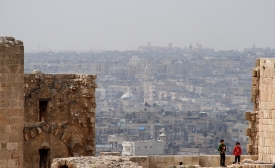netherlands
Finding any encouraging news coming out of Syria is difficult. The Bashar Assad regime clearly will pay any price to retain power, inflicting misery upon those parts of the population it can reach. Parts of Syria, however, remain outside the control of the government and the similarly vile extremist groups that defile their religion through their bloody tactics.

Maintaining order in some areas of the failed state is a constant struggle against anarchy. The Integrated Community Security Program (ICSP) may be the answer.
The team that lost this week is trying to beat the other team that lost this week. It's Brazil versus Netherlands -- honestly, I may have that wrong -- and at this point, even Brazilian supermodel Adriana Lima is barely interested. From a geopolitical balance-of-power perspective, does anyone care who comes in third? Is there a war in history where a country took home (at least, what was left of home) the proverbial bronze medal? After President Bush declared Mission Accomplished in the Iraq war, did he announce a run-off between Afghanistan and Iran?
The Netherlands might be giving one of its long-running traditions a makeover, for a very good reason. During parades celebrating Christmas, crowds are peppered with revelers in blackface, who are dressed up as Zwarte Piet, or "Black Pete", the dumb, servile sidekick of Santa Claus, according to Dutch folklore. While some might argue that the practice is nothing more than a harmless tradition, a Dutch court ruled on July 3 that Amsterdam should reconsider allowing the controversial figure in its parades, since it reinforces negative stereotypes of black people.
In December 2012, Shaun Donovan, the secretary of Housing and Urban Development, was on vacation in Berlin when he decided to detour to the Netherlands. He wanted to get a firsthand sense of the famed Dutch approach to water management.
The overall medal count obscures how these small countries are outperforming their rivals in 2014.Judging by the overall tally at the Sochi Olympics, the Netherlands is currently ahead of all other nations with 17 total medals. The United States and Russia are tied for a close second with 16 medals each.
Over the past few decades, it has become possible to speak of a "global food system"—shorthand for the trade patterns, shaped by multinational companies, that move raw agriculture commodities and processed food across borders. Yet as this fascinating new Oxfam study shows, there are still huge differences in people's experience of food across the globe. Oxfam ranked nations on four criteria: whether food exists in plentiful supply, whether it's broadly affordable, whether it's of good quality, and whether it's causing high rates of obesity and diabetes.







